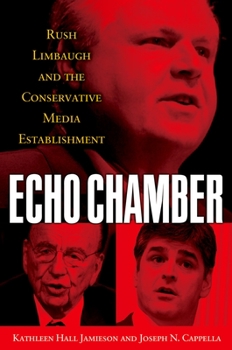Echo Chamber: Rush Limbaugh and the Conservative Media Establishment
Select Format
Select Condition 
Book Overview
Rupert Murdoch's recent multibillion-dollar purchase of the Wall Street Journal made international news. Yet it is but one more chapter in an untold story: the rise of an integrated conservative media machine that all began with Rush Limbaugh in the 1980s.
Now Kathleen Hall Jamieson and Joseph Cappella--two of the nation's foremost experts on politics and communications--offer a searching analysis of the conservative media establishment, from...
Format:Hardcover
Language:English
ISBN:0195366824
ISBN13:9780195366822
Release Date:July 2008
Publisher:Oxford University Press, USA
Length:320 Pages
Weight:1.38 lbs.
Dimensions:1.1" x 9.3" x 6.0"
Customer Reviews
4 ratings
Telling it as it is.
Published by Thriftbooks.com User , 14 years ago
Although, I haven't had the opportuity to read the book, from my browsing through it,I think it hits the nail on the head.
Exploring Hate Speech
Published by Thriftbooks.com User , 14 years ago
This book was very helpful in exploring the current climate of hate speech and politics.
Top Notch Book
Published by Thriftbooks.com User , 15 years ago
At a time when the future of the nation is at stake the authors do an excellent job of identifying the methods of the rabid right wing in America.
Slanted packaging, but sound content
Published by Thriftbooks.com User , 15 years ago
The back-cover blurbs, title, chosen subject matter, cover art, and the use of scare quotes around terms like "liberal media" all contribute to an overwhelming but incorrect first impression: The book looks at first glance like a hand-wringing, liberal worryfest about how conservatives are ... well, talking. I'm a conservative, so I'll grant I'm a little sensitive to these things (just as liberals are sensitive to slander). However, I'm also a teacher and specialist in rhetoric, and quite interested in the rhetoric of opinion leaders like Limbaugh and Michael Moore. So I read the book despite my initial cringe, and I have to say it's a sharp piece of analysis, fair to its subjects, balanced in its perspectives, and darned useful to those of us interested in studying or discussing the intersection of media, rhetoric, and politics. The authors approach the topic from the perspective of interested observers, rather than from a judgmental frame. They note at the start of their concluding chapter that they've probably disappointed both Left and Right readers, and I think that's a safe prediction. Unbalanced readers tend not to like balanced analysis. But I certainly appreciate it, as it's hard to come by, even when the authors are respected scholars. I'm sure I'll be citing this book in some of my future work. The authors have, to my eye at least, accurately described the rhetorical strategies and effects of conservative, alternative media. The title alludes to the book's central conclusion, which is that these sorts of narrow-audience media use framing strategies that inoculate listeners and readers against alternative viewpoints, encouraging the audience to depend increasingly on the echo chamber while dismissing messages that seem to undermine the audience's philosophy. The authors, to their credit, note that liberal-leaning media have similar echo-chamber effects. (An aside: All media do, and not necessarily in ways that are political. For instance, print, Web, TV, and radio media often play this very same game with each other in the competition for a dwindling audience.) The authors suggest that the effects of the emerging conservative echo chamber are neither all-beneficial, nor all-problematic, but rather mixed: On the one hand, echo chambers motivate people to participate in politics, and expose them to alternative viewpoints -- even if those viewpoints are refuted and framed at a disadvantage. The authors also see the rise of a conservative echo chamber as a kind of welcome correction to the previous era of mainstream media, in which all of the messages were similar. Now, at least, there are multiple voices. On the other hand, the authors argue that echo chambers can be destructive when the opposing viewpoints they describe are ridiculed or subjected to ad hominem (personal) attacks, suggesting that these trends would be healthier if participants tried a bit harder to fight fair. Which brings me full circle: To date, a lot of the comm




